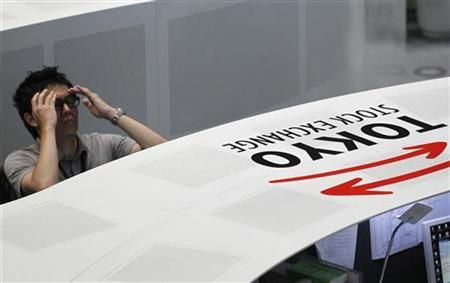Analysis: Japan in Ratings Crosshairs as Debt in Focus

In the guessing game of which Asian sovereign credit will be downgraded next, after the United States this weekend, Japan is almost everyone's top pick, and not simply because its debt burden and messy politics are as bad if not worse than America's.
Standard & Poor's historic downgrade of the U.S. AAA rating has changed the ratings landscape in some ways, one being to put the spotlight squarely and closely on the political climate in countries with massive debts.
This time, it is the purely the ability to deal with either a full-blown financial crisis spawned by Europe's debt woes or a protracted global economic downturn that has ratings agencies focusing on the how deep the fiscal pockets are.
The obvious losers in such a scenario would be governments like Japan's with no means to either defend their markets or stimulate their economies without getting deeper in debt.
S&P was quick to point out on Monday, as stock markets tumbled in reaction to the U.S. losing its top-tier rating, that the implications for Asia's creditworthiness would be more negative than in the past.
"The fiscal capacities of Japan, India, Malaysia, Taiwan, and New Zealand have shrunk relative to pre-2008 levels," S&P said in a statement. "If a renewed slowdown comes, it would likely create a deeper and more prolonged impact than the last one."
With gross government debt at twice its $5 trillion economy, Japan is pretty much on every rating agency's radar even though most of the debt is owned and funded by Japanese investors.
S&P already has the sovereign on an AA-minus rating, with a negative outlook. Fitch Ratings likewise has a negative outlook.
Moody's Investors Service has Japan's AA2 rating on a review for a possible rating. That decision, due within weeks, should be a downgrade for an economy which has been contracting for three consecutive quarters and whose unpopular prime minister has struggled to get a massive reconstruction spending passed by a highly divided parliament.
Moody's warned as much on Monday, telling Japan its intervention in foreign exchange markets last Thursday to weaken the rising yen would both be ineffective and negative for its ratings.
"The same logic that S&P applied to the United States can be applied to Japanese politics in that they can't decide anything. So a downgrade for Japan is quite likely," Masamichi Adachi, senior economist at JPMorgan in Tokyo.
SLOW GROWTH? OR RISK AVERSION?
Besides Japan, though, credit analysts find little else in Asia to worry about. Indonesia is well on track for a bump up to investment grade in the next few years, while the Philippines is also hoping for one.
Goldman Sachs on Monday moved its rating on Indian markets to overweight -- a reflection of the lure the region's high yields, strong growth rates and healthy fiscal balances still have for investors, a differentiator that the U.S. rating cut helped underscore.
If push came to shove, one could categorize New Zealand as being in the high risk category, given its vulnerability to a financial crisis.
Both S&P and Fitch have negative outlooks on New Zealand. That economy has been running current account deficits for almost four decades, resulting in net foreign debt of NZ$148 billion in March 2011, which is about 77 percent of the economy.
Another 58.5 percent of government bonds and bills are held by foreigners.
"We are not immune to what is going on obviously," Khoon Goh, head of market economics and strategy at ANZ. "But at this stage, I don't see that is being material enough to affect our credit rating."
Another candidate that S&P reckons is vulnerable both on account of its high dependence on exports as well as weak capacity for additional government spending is Taiwan.
With a net government debt position that is running close to 40 percent of GDP, Taiwan could for instance find its ability to shore up its economy encumbered. But it has to its advantage a $20 million stockpile of foreign reserves.
HSBC's head of global research Dilip Shahani says the odds of any downgrades in Asian sovereign credit are pretty low, at least in the next three years.
"If anything, the path is an upwards trajectory for ratings," he says.
(Additional reporting by Mantik Kusjanto; Writing by Vidya Ranganathan; Editing by Kim Coghill)
© Copyright Thomson Reuters 2024. All rights reserved.





















